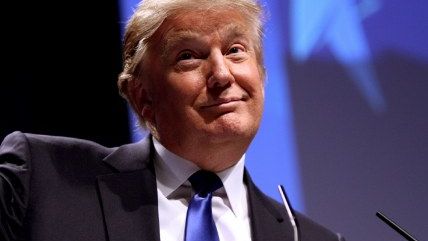We Were Kidding About Donald Trump Literally Taking the U.S. to Bankruptcy Court, Right?
GOP presumptive nominee discusses renegotiating federal debt, like struggling economies do.


Most of us look at Puerto Rico's financial situation—out-of-control debt it can no longer pay off—and see it as a dire warning. It's possible that GOP presumptive presidential nominee Donald Trump doesn't see it that way.
That is to say, Trump's latest proposed economic solution for federal debt is to do what Puerto Rico is likely going to have to do try to remain solvent—ask creditors to take a haircut on outstanding debts. Such is the way of the world for struggling businesses and dysfunctional economies like Greece. The idea that America itself might pursue such a strategy is a novel suggestion, to say the least. Trump's musing that America might skate to the brink of default for the sake of a deal seems to have prompted a parade of spit takes from economic analysts. Josh Marshall went on a tear at Talking Points Memo:
It's a sovereign nation with sovereign debt. It is not too much to say that centuries of American prosperity have been undergirded by the "full faith and credit of the United States." In other words, the US always pays its debts in full and on time. Indeed, it's black letter text in the US constitution that the country's debt can never even be questioned. Defaulting on the national debt would clearly be unconstitutional.
That's the constitution part, which is a weighty matter. But the entire architecture of the global economy and the United States place in it rests on the certainty and basic risklessness of US government debt obligations. It's as simple as that. (This has actually allowed the US to in effect have people pay the Treasury to hold on to their money since 2008.) Introducing the idea that the US might pay back only a portion of the returns on Treasury bonds would basically disrupt the entire global economy, have massive and traumatic knock-on effects on the US economy and its ability to service its own debt. It would be catastrophic, an entirely self-inflicted wound.
Trump seems to have immediately backpedaled on the idea a bit and switched to suggesting that the U.S. could seek to repurchase its own debt on better terms, again something that's not uncommon in the corporate world. But there's a slight problem with trying to translate it to the United States: The government operates at a deficit and his solution would result in having to borrow even more money in order to pursue such a plan.
Trump's perception of how debt works ("I am the king of debt. I do love debt. I love debt. I love playing with it," he said) could help explain why thinks he can promote fiscally incoherent polices that call for both tax cuts and military spending increases (while maintaining Social Security). Trump believes that everything is up for negotiation—everything has the potential for a deal. This is not a bad trait for either a businessman or a politician, but it can reach a point where it becomes a default response when unable to actually explain how he's going to get from Point A to Point B in policies. For Trump, making a "deal" is his variation of candidates like Bernie Sanders who want to paper over fiscal gaps in policy plans with promises to make rich people and corporations pay for it.
I'll let The Economist get the final punchline on the problem with trying to force any sort of debt renegotiations:
A forced deal, of course, would count as a default. Treasury bonds are at the heart of the financial system. Banks use them as collateral for loans; insurance companies hold them as reserves; pension funds own then to fund retirement benefits; mutual funds own them as well. Any default within the system would have cataclysmic consequences for the economy that would far outweigh any gains in refinancing costs. To cap it all, the Federal Reserve owns almost $2.5 trillion of Treasury bonds and the Social Security Fund some $2.8 trillion. So the government would, in part, be defaulting to itself.


Show Comments (57)